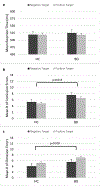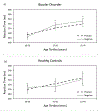Age moderates the relationship between affective response inhibition and bipolar disorder in adults
- PMID: 34482062
- PMCID: PMC8577218
- DOI: 10.1016/j.jad.2021.08.019
Age moderates the relationship between affective response inhibition and bipolar disorder in adults
Abstract
Background: Patients with bipolar disorder (BD) often have impairments in neurocognition, including affective processing and affective response inhibition. While studies suggest that cognitive control in general may decline with age in BD, less is known about age-related changes in response inhibition to emotionally salient information.
Methods: 258 participants with BD and 54 healthy controls, ages 18-70, completed the Cambridge Neuropsychological Test Automated Battery (CANTAB) Affective Go/No-Go task to assess affective response inhibition to positive and negative valenced stimuli. We examined the relationship between BD and affective response inhibition (number of commission and omission errors and reaction time), as well as a potential moderating effect of age, using mixed effects linear regression models.
Results: The BD group made more omission and commission errors overall than the control group (p < 0.018). We observed a significant 3-way group-by-age-by-valence interaction for reaction time (p = 0.006). Within BD, a slower reaction time to negative than positive stimuli was found in middle and older age groups (p < 0.012), but not in the younger age group. No significant moderating effect of age was observed within the control group.
Conclusions: These cross-sectional findings indicate that compared with healthy controls, individuals with BD display differential and age-related effects in inhibition to emotionally salient information that is valence-dependent. The observed pattern of a switch in bias from negative to positive stimuli with age in BD may aid in our understanding of the progression of neurocognitive changes with aging in BD, as well as inform targeted treatments for cognitive symptoms.
Keywords: Affective response inhibition; Aging; Bipolar disorder; Neurocognition.
Copyright © 2021. Published by Elsevier B.V.
Conflict of interest statement
CONFLICT OF INTEREST
All authors declare no conflict of interest.
Figures



